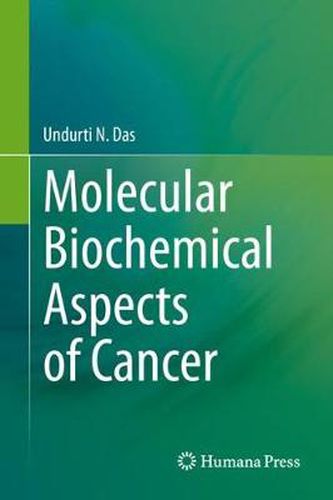Readings Newsletter
Become a Readings Member to make your shopping experience even easier.
Sign in or sign up for free!
You’re not far away from qualifying for FREE standard shipping within Australia
You’ve qualified for FREE standard shipping within Australia
The cart is loading…






This book discusses the role of genes, oncogenes, anti-oncogenes, free radicals, PUFAs, anti-oxidants, lipid peroxidation process, telomere, and angiogenesis on the origin of cancer, cell proliferation, and cancer in general. It includes a broad introduction to cancer cells; genes, oncogenes, and anti-oncogenes; and free radicals. In later chapters, it discusses in depth the relationship among free radicals, lipid peroxidation and anti-oxidants in cell proliferation. It also discusses aerobic and anaerobic metabolism and their relationship to cancer, as well as the Warburg effect and its potential in the development of new targets for cancer management. Based on these and other evidences, Molecular Biochemical Aspects of Cancer introduces a novel concept that suggests that selective enhancement of free radical generation in tumor cells could form a strategy to induce apoptosis of cancer cells employing bioactive lipids. It presents a new method of treatment of cancer using in vitro, in vivo and clinical data. This book will interest oncologists, scientists, molecular biologists, life scientists.
$9.00 standard shipping within Australia
FREE standard shipping within Australia for orders over $100.00
Express & International shipping calculated at checkout
This book discusses the role of genes, oncogenes, anti-oncogenes, free radicals, PUFAs, anti-oxidants, lipid peroxidation process, telomere, and angiogenesis on the origin of cancer, cell proliferation, and cancer in general. It includes a broad introduction to cancer cells; genes, oncogenes, and anti-oncogenes; and free radicals. In later chapters, it discusses in depth the relationship among free radicals, lipid peroxidation and anti-oxidants in cell proliferation. It also discusses aerobic and anaerobic metabolism and their relationship to cancer, as well as the Warburg effect and its potential in the development of new targets for cancer management. Based on these and other evidences, Molecular Biochemical Aspects of Cancer introduces a novel concept that suggests that selective enhancement of free radical generation in tumor cells could form a strategy to induce apoptosis of cancer cells employing bioactive lipids. It presents a new method of treatment of cancer using in vitro, in vivo and clinical data. This book will interest oncologists, scientists, molecular biologists, life scientists.